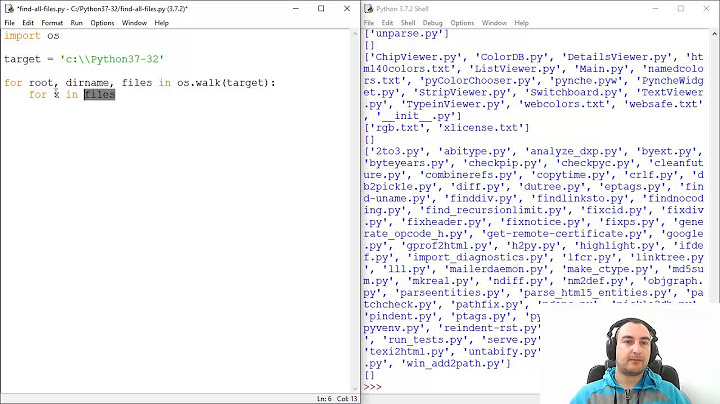Python list directory, subdirectory, and files
Solution 1
Use os.path.join to concatenate the directory and file name:
for path, subdirs, files in os.walk(root):
for name in files:
print(os.path.join(path, name))
Note the usage of path and not root in the concatenation, since using root would be incorrect.
In Python 3.4, the pathlib module was added for easier path manipulations. So the equivalent to os.path.join would be:
pathlib.PurePath(path, name)
The advantage of pathlib is that you can use a variety of useful methods on paths. If you use the concrete Path variant you can also do actual OS calls through them, like changing into a directory, deleting the path, opening the file it points to and much more.
Solution 2
Just in case... Getting all files in the directory and subdirectories matching some pattern (*.py for example):
import os
from fnmatch import fnmatch
root = '/some/directory'
pattern = "*.py"
for path, subdirs, files in os.walk(root):
for name in files:
if fnmatch(name, pattern):
print(os.path.join(path, name))
Solution 3
Couldn't comment so writing answer here. This is the clearest one-line I have seen:
import os
[os.path.join(path, name) for path, subdirs, files in os.walk(root) for name in files]
Solution 4
Here is a one-liner:
import os
[val for sublist in [[os.path.join(i[0], j) for j in i[2]] for i in os.walk('./')] for val in sublist]
# Meta comment to ease selecting text
The outer most val for sublist in ... loop flattens the list to be one dimensional. The j loop collects a list of every file basename and joins it to the current path. Finally, the i loop iterates over all directories and sub directories.
This example uses the hard-coded path ./ in the os.walk(...) call, you can supplement any path string you like.
Note: os.path.expanduser and/or os.path.expandvars can be used for paths strings like ~/
Extending this example:
Its easy to add in file basename tests and directoryname tests.
For Example, testing for *.jpg files:
... for j in i[2] if j.endswith('.jpg')] ...
Additionally, excluding the .git directory:
... for i in os.walk('./') if '.git' not in i[0].split('/')]
Solution 5
A bit simpler one-liner:
import os
from itertools import product, chain
chain.from_iterable([[os.sep.join(w) for w in product([i[0]], i[2])] for i in os.walk(dir)])
Related videos on Youtube
thomytheyon
Updated on March 30, 2022Comments
-
thomytheyon about 2 years
I'm trying to make a script to list all directory, subdirectory, and files in a given directory.
I tried this:import sys, os root = "/home/patate/directory/" path = os.path.join(root, "targetdirectory") for r, d, f in os.walk(path): for file in f: print(os.path.join(root, file))Unfortunatly it doesn't work properly.
I get all the files, but not their complete paths.For example if the dir struct would be:
/home/patate/directory/targetdirectory/123/456/789/file.txt
It would print:
/home/patate/directory/targetdirectory/file.txt
What I need is the first result. Any help would be greatly appreciated! Thanks.
-
Roman Rdgz about 9 yearsIt does work, but to excluve .git directoy you need to check if '.git' is NOT into the path.
-
Roman Rdgz about 9 yearsYep. Should be if '.git' not in i[0].split('/')]
-
ThorSummoner over 7 yearsI would recommend
os.walkover a manual dirlisting loop, generators are great, go use them. -
harrisonfooord over 5 yearsthis is the one and only useful answer for the many questions that have been asked concerning "how to get all files recursively in python".
-
Nir almost 5 yearscomprehension list: all_files = [os.path.join(path, name) for name in files for path, subdirs, files in os.walk(folder)]
-
 Ehsan almost 4 yearsIn Python3 use parenthesis for print function
Ehsan almost 4 yearsIn Python3 use parenthesis for print functionprint(os.path.join(path, name)) -
Ahmad Ismail almost 3 yearsIn Python3 use parenthesis for print function
print(os.path.join(path, name)). You can also useprint(pathlib.PurePath(path, name)). -
 Aakash Gupta almost 3 yearshow do I list each file ?
Aakash Gupta almost 3 yearshow do I list each file ? -
Matt over 2 yearsthis is the answer for all you googlers








